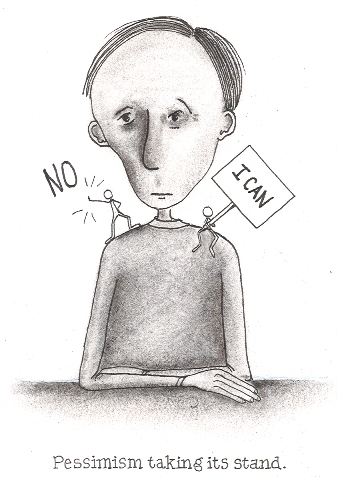Accidentally Optimistic: Patience as the Cure for Pessimism
by Jennifer Paros
Illustration by Jennifer Paros - Copyright 2009
In my youngest son’s classroom, they have a list up on the wall of the “Way to Be”. Things like “Be respectful of others” are listed, and at the bottom is: “Have an I CAN attitude!” When I saw this, I thought it was a great directive, and I very much hoped they were teaching the children how to do that. Because I’m not sure that I know how to have an “I Can Attitude” on command.
It’s easy for me to ruminate negatively on what I’ve written, to focus on the possibility of it not coming together, of it not being “good enough” or of not being able to get it published. But these are not profound insights, they’re just black magic. What I am stirring up in myself is a brew of pessimism that can only drag me and my process down. So, how does one summon optimism? Often optimism is resorted to once pessimism leaves us so desperate that we finally become willing to embrace a little hope. But that’s really not the happiest way to travel.
Although pessimism has often been associated with intelligence, viewed as a kind of critical and realistic thinking, in truth all it does is set the stage for a general mistrust of life. There is nothing inherently smart about being negative, and what is sometimes mistaken for the stance of an intelligent, assessing faculty is actually just the stance of someone who is afraid – afraid he is not going to get what he wants, and impatient to have it now in order to disprove the fear.
This last Christmas, my teenage son wanted a game console that was fairly expensive, so he decided to ask all gifting relatives for a cash donation. The day the monies rolled in – Christmas Day – he wanted to make the purchase immediately. But stores were closed and on-line sources were out of stock. Urgently, he pressured us to put in our e-bay bid. His drive to have it now, which was leading to no success, was leaving him convinced he was defeated. But truly he wasn’t defeated, he was just impatient. The next day after calls were made and no store could say when more stock would be arriving, he considered forgetting the whole thing.
The day after that, we were out in a department store and I thought to go to the electronics department and ask about the game system. In a somewhat covert fashion, I was quietly clued in to come at opening the next morning.
Sunday morning at six am: I found myself outside the store next to a troubled looking old man perched and rocking in front of the automated doors, a teenage girl talking on her cell phone, her mother and my son, who chose to stand very far away. The doors finally opened. Inside, the shelf where the console should have been was bare. Overwhelmed with the negative confirmation, my son wanted out. Despite his frustrated arguments, at my suggestion, we stayed and looked around more. Then the woman, there with her daughter, let me know she’d asked about the game system. Within minutes out rolled a cart with several boxes.
If we had left when he’d wanted to, when his pessimism was making its stand, he would not have gotten what he wanted, but he would have managed to prove his negative thoughts correct. “Reality,” at that point, was on the verge of birthing something; it was malleable. But an “I Can Attitude!” wasn’t even necessary for desirable results, just a little patience. With true patience comes respect for whatever process we’re in as well as openness that turns out to be a back door in to authentic optimism --without even having to don pompoms or overt hopefulness!
Can we do it, have it, be it? That’s up to each of us. But I do know pessimism will not make it so we can, or protect us from the pain of seemingly not being able to. And in fact, if we’re running enough of a soundtrack of negative thoughts, we may find ourselves, like my son, unconsciously taking steps toward proving our own pessimistic hypothesis and abandoning what we want right before we’re about to get it.
So, in place of pessimism, let us choose to be patient. Patience allows us the room to work unprovoked by the idea of “failure” and in this way we get to feel more like we “can” every day. And before we know it, we’ve become accidentally optimistic.
Jennifer Paros is a writer, illustrator, and author of Violet Bing and the Grand House (Viking, 2007). She lives in Seattle.

